Ford Transit Transporter vs Toyota Proace City - Differences and prices compared
Compare performance (269 HP vs 136 HP), boot space and price (39900 £ vs 20800 £) at a glance. Find out which car is the better choice for you – Ford Transit Transporter or Toyota Proace City?
Costs and Efficiency:
Looking at overall running costs, both models reveal some interesting differences in everyday economy.
Toyota Proace City has a convincingly advantage in terms of price – it starts at 20800 £, while the Ford Transit Transporter costs 39900 £. That’s a price difference of around 19135 £.
Fuel consumption also shows a difference: Toyota Proace City manages with 5.30 L and is therefore clearly more efficient than the Ford Transit Transporter with 7.90 L. The difference is about 2.60 L per 100 km.
In terms of energy consumption, the advantage goes to the Toyota Proace City: with 18.10 kWh per 100 km, it’s a bit more efficient than the Ford Transit Transporter with 21.30 kWh. That’s a difference of about 3.20 kWh.
As for range, the Ford Transit Transporter performs slightly better – achieving up to 402 km, about 59 km more than the Toyota Proace City.
Engine and Performance:
Power, torque and acceleration say a lot about how a car feels on the road. This is where you see which model delivers more driving dynamics.
When it comes to engine power, the Ford Transit Transporter has a clearly edge – offering 269 HP compared to 136 HP. That’s roughly 133 HP more horsepower.
In terms of top speed, the Toyota Proace City performs distinct better – reaching 186 km/h, while the Ford Transit Transporter tops out at 120 km/h. The difference is around 66 km/h.
There’s also a difference in torque: Ford Transit Transporter pulls evident stronger with 430 Nm compared to 300 Nm. That’s about 130 Nm difference.
Space and Everyday Use:
Beyond pure performance, interior space and usability matter most in daily life. This is where you see which car is more practical and versatile.
Seats: Toyota Proace City offers to a small extent more seating capacity – 7 vs 6.
In curb weight, Toyota Proace City is decisively lighter – 1366 kg compared to 2074 kg. The difference is around 708 kg.
In maximum load capacity, the Ford Transit Transporter performs clearly better – up to 14100 L, which is about 11407 L more than the Toyota Proace City.
When it comes to payload, Ford Transit Transporter clearly takes the win – 2607 kg compared to 869 kg. That’s a difference of about 1738 kg.
Who wins the race?
The Ford Transit Transporter proves to be is largely superior and therefore becomes our DriveDuel Champion!
Ford Transit Transporter is the better all-rounder in this comparison.

Ford Transit Transporter
Costs and Consumption
View detailed analysis
Engine and Performance
View detailed analysis
Dimensions and Body
View detailed analysis
Ford Transit Transporter
The Ford Transit is the no-nonsense workhorse that turns heavy-duty hauling into a surprisingly civilized experience, with a cabin that favors practicality over pretense. It’s the go-to for tradespeople and fleet managers who want reliability, adaptability and low running headaches — not showy gimmicks.
details


Toyota Proace City
The Toyota Proace City is a clever compact workhorse that blends van practicality with passenger comfort, turning daily deliveries or weekend DIY runs into a surprisingly civilised affair. It won't set your pulse racing, but its easy driving manners, flexible interior and low-hassle ownership make it a smart pick for buyers who value usefulness over flash.
details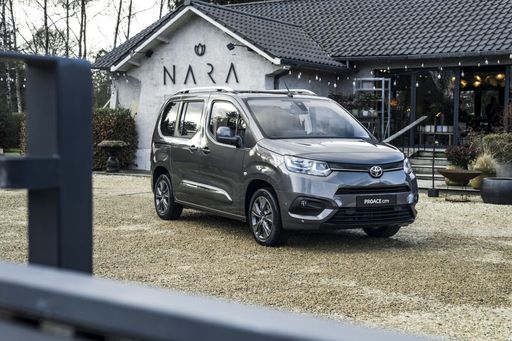
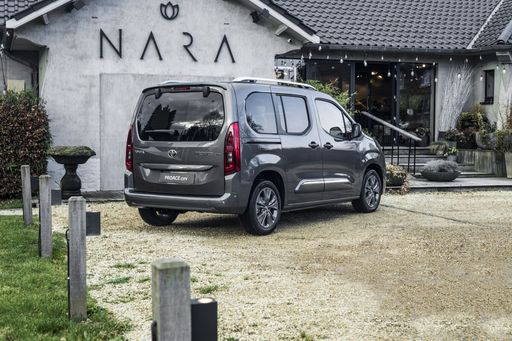
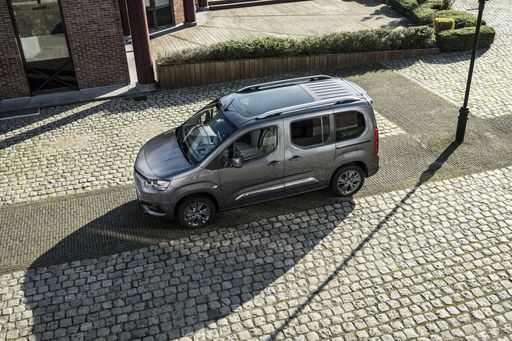
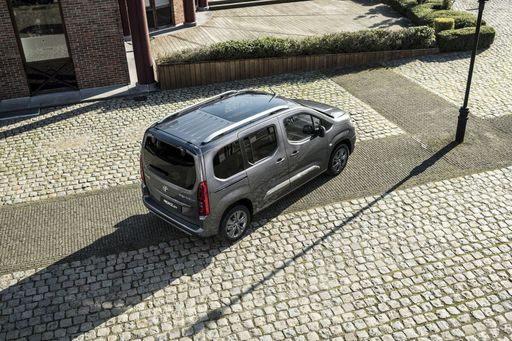
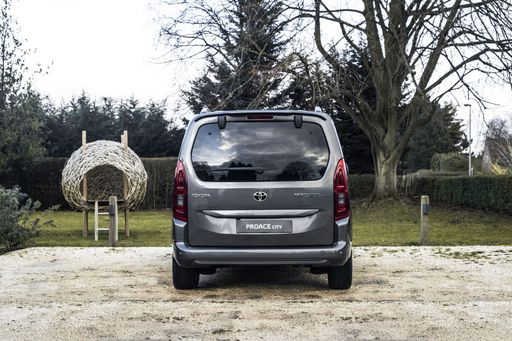
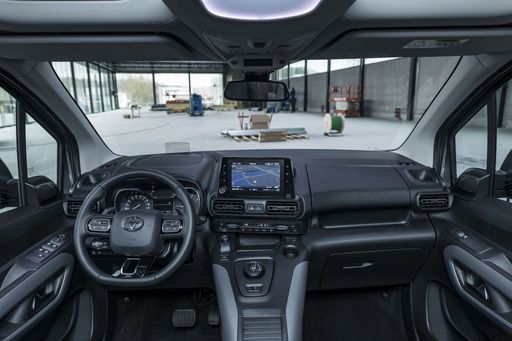

|

|
|
|
|
Costs and Consumption |
|
|---|---|
|
Price
39900 - 73000 £
|
Price
20800 - 44100 £
|
|
Consumption L/100km
7.9 - 10.3 L
|
Consumption L/100km
5.3 - 6.3 L
|
|
Consumption kWh/100km
21.3 - 32 kWh
|
Consumption kWh/100km
18.10 kWh
|
|
Electric Range
247 - 402 km
|
Electric Range
343 km
|
|
Battery Capacity
68 kWh
|
Battery Capacity
-
|
|
co2
0 - 270 g/km
|
co2
0 - 146 g/km
|
|
Fuel tank capacity
70 L
|
Fuel tank capacity
50 - 61 L
|
Dimensions and Body |
|
|---|---|
|
Body Type
Cargo Van
|
Body Type
High Roof Estate
|
|
Seats
3 - 6
|
Seats
5 - 7
|
|
Doors
4
|
Doors
4 - 5
|
|
Curb weight
2074 - 2765 kg
|
Curb weight
1366 - 1664 kg
|
|
Trunk capacity
-
|
Trunk capacity
322 - 912 L
|
|
Length
5531 - 6704 mm
|
Length
4401 - 4751 mm
|
|
Width
2059 mm
|
Width
1848 mm
|
|
Height
2530 - 2778 mm
|
Height
1812 - 1818 mm
|
|
Max trunk capacity
9300 - 14100 L
|
Max trunk capacity
2126 - 2693 L
|
|
Payload
735 - 2607 kg
|
Payload
525 - 869 kg
|
Engine and Performance |
|
|---|---|
|
Engine Type
Diesel, Electric
|
Engine Type
Petrol, Diesel, Electric
|
|
Transmission
Manuel, Automatic
|
Transmission
Manuel, Automatic
|
|
Transmission Detail
Manual Gearbox, Automatic Gearbox, Reduction Gearbox
|
Transmission Detail
Manual Gearbox, Reduction Gearbox, Automatic Gearbox
|
|
Drive Type
Front-Wheel Drive, Rear-Wheel Drive, All-Wheel Drive
|
Drive Type
Front-Wheel Drive
|
|
Power HP
105 - 269 HP
|
Power HP
102 - 136 HP
|
|
Acceleration 0-100km/h
-
|
Acceleration 0-100km/h
11.5 - 13.2 s
|
|
Max Speed
120 km/h
|
Max Speed
135 - 186 km/h
|
|
Torque
310 - 430 Nm
|
Torque
205 - 300 Nm
|
|
Number of Cylinders
4
|
Number of Cylinders
3 - 4
|
|
Power kW
77 - 198 kW
|
Power kW
75 - 100 kW
|
|
Engine capacity
1996 cm3
|
Engine capacity
1199 - 1499 cm3
|
General |
|
|---|---|
|
Model Year
2019 - 2024
|
Model Year
2024 - 2025
|
|
CO2 Efficiency Class
G, A
|
CO2 Efficiency Class
E, A
|
|
Brand
Ford
|
Brand
Toyota
|
What drivetrain options does the Ford Transit Transporter have?
Available configurations include Front-Wheel Drive, Rear-Wheel Drive or All-Wheel Drive.
The prices and data displayed are estimates based on German list prices and may vary by country. This information is not legally binding.
